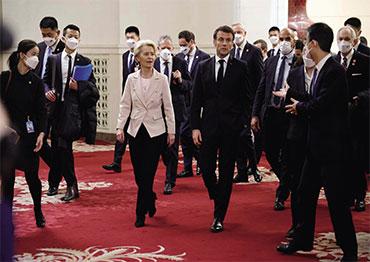In recent months, the EU has apparently started to adopt a “de-risking” approach – reducing its dependence on China in strategic sectors – rather than the decoupling suggested by US policy.
This concept of “de-risking” was raised by European Commission President Ursula von der Leyen in her speech delivered in Brussels on March 29, ahead of her visit to China with Macron from April 5 to 7. Emphasizing that it is of vital importance to keep communication lines with China open, von der Leyen urged the EU to put economic derisking at the center of the bloc’s China strategy.
Although von der Leyen, known as a so-called China hawk, told the European Parliament on April 18 that decoupling with China is not “viable” nor “desirable,” her depiction of China as posing a systemic threat to the international system and her vision of the de-risking strategy appears more in line with US policy.
During a press conference following a meeting between Chinese Foreign Minister Qin Gang and his German counterpart Annalena Baerbock in Berlin on May 9, Qin expressed his concerns over the EU’s de-risking agenda. “If the EU seeks to decouple from China in the name of de-risking, it will decouple from opportunities, cooperation, stability and development,” Qin said.
Qin added that one must first consider what and where the risks are when they talk about de-risking. Without naming the US, Qin stressed that the real risk the world faces stems from the “new Cold War” launched by “certain countries.”
Qin made the comments during his visit to Germany, France and Norway from May 8 to 12. During his stop in France on May 11, Qin told his French counterpart Catherine Colonna that China has always regarded Europe as a comprehensive strategic partner and that the China-Europe relationship should not be subjugated to or controlled by any third party. At a press conference in Oslo with his Norwegian counterpart Anniken Huitfeldt, Qin noted he deeply felt the European side’s strong willingness to strengthen communication and coordination and promote mutually beneficial cooperation with China.
In an opinion piece published by the South China Morning Post on May 11, Zhou Xiaoming, a senior fellow at the Center for China and Globalization in Beijing and a former deputy representative of China’s Permanent Mission to the United Nations Office in Geneva, warned that de-risking is just a euphemism for decoupling.
Zhou noted that given the unpopularity of the term “decoupling,” Washington itself has begun substituting the term with “de-risking.” US National Security Adviser Jake Sullivan, for example, said in a speech at the Brookings Institution that “we are for de-risking and diversifying, not for decoupling.”
While these remarks may send some relief, such optimism could prove to be a false hope, Zhou said. “The truth is that this is nothing short of decoupling in action,” as Washington continues to blacklist Chinese companies and restrict investment both to and from China in key areas, Zhou added.

 Old Version
Old Version


